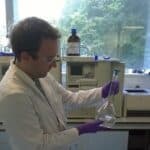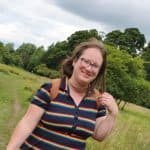Profile
Christopher Payne
-
About Me:
I live with my partner, two cats and a lizard in South of England. I love scuba diving 🤿, testing new recipes in the kitchen and binge-watching fantasy movies/TV shows 🪄🧌🐉
-
Read more
Hi everyone! My name is Christopher Payne, and I’m a scientist who has recently moved back to the South of England after living in Scotland for over ten years. My husband and I decided to move back so we could be closer to our families. It’s lovely to be near them again! We also live with our two very fluffy and friendly ragdoll cats. They absolutely love lying in the sun and being groomed – they’re definitely the pampered ones in our house! We also have a Bearded Dragon who turns 15 in 2025.
I’ve always loved the ocean, even when I was at school. That passion led me to study Marine Biology at university, which meant I got to learn all about sea creatures, coral reefs, and ocean ecosystems. I’ve worked at a public aquarium, helping care for marine animals and teach people about them, and I’ve also been lucky enough to volunteer with a turtle conservation group, helping protect wild sea turtles.
About a year ago, I started learning to scuba dive, and I’ve really fallen in love with it. It’s so calm and peaceful under the water, and I’m constantly amazed by the wildlife I see. I’ve dived all over Scotland and even in Asia, where I had one of my most exciting moments—seeing a sea turtle in the wild for the very first time!
Since finishing my degree in Marine Biology, I’ve moved into Microbiology, which is the study of tiny living things like bacteria. I’ve been working in this field for over ten years now. I find microbes fascinating—did you know that over 99.9% of all microbial life on earth are still unknown to science? I love studying how bacteria interact with their environment, including how they affect animals.
When I’m not working or diving, I enjoy cooking. My favourite things to make are Italian dishes and curries—my lasagne and chicken curry are favourites in our house! In the evenings, I love relaxing with a good film. I’m a big fan of Harry Potter and anything to do with Lord of the Rings. Fantasy stories are such a fun way to escape into a different world!
-
My pronouns are:
He/him
-
My Work:
I am a microbiologist. I study tiny living things called bacteria that make fish sick and use science to help create vaccines that protect them from disease.
-
Read more
I am a microbiologist, which means I study tiny living things called microbes—especially bacteria. Even though they are too small to see without a microscope, bacteria are everywhere! Some bacteria are helpful, but others can cause disease in people, animals, and even fish.
In my job, I focus on bacteria that make fish sick. This is really important for fish farms, where lots of fish live close together and diseases can spread easily. If too many fish get sick, it can be bad for the environment, for the people who work on the farms, and for those who eat the fish. My work helps solve this problem.
I use microbiology and a science called molecular biology to study these harmful bacteria. Molecular biology helps me look at the tiny building blocks of life, like DNA and proteins, to understand how bacteria work. I can then look at how the bacteria infect fish and how the fish’s immune system fights back. This helps me and my team figure out how to make vaccines—like the ones you might get at the doctor’s—to protect fish from these diseases before they get sick. It’s a bit like giving them a shield!
Vaccines for fish help keep them healthy, reduce the need for antibiotics, and make fish farming more sustainable. It’s really exciting to know that our science can make a big difference.
I’ve been working in microbiology for over ten years, and I still learn new things all the time. Microbes are incredibly clever and mysterious—there’s so much more to discover. I love being a scientist because I get to solve puzzles, protect animal health, and help people at the same time.
-
My Typical Day:
My typical day starts at around 6:30-7am, when I wake up and have breakfast. I get to work for 8am where I will catch up on my emails and any admin work. I head into the lab around 10am, where I do lots of experiments in the lab. I normally have lunch around 1pm and will often go on a short 20-30 minute walk, before heading back to the lab to finish off any lab work or look at my results. I normally finish work around 4-5pm.
-
Read more
My typical day as a scientist usually starts around 6:30 or 7:00 in the morning. I have breakfast and get ready for the day, then head into work so I can start by 8:00am. The first thing I do is check my emails and catch up on any important messages or admin work—this might include planning experiments, writing notes, or checking on lab equipment bookings.
Around 10:00am, I head into the lab, which is where most of the exciting science happens! I wear a lab coat and gloves to stay safe and keep my work clean. Some days, I grow bacteria in small dishes and test how the bacteria cells behave or respond to antibiotics. Other times, I use tools from molecular biology to study the bacteria’s DNA. This helps me find out what genes the bacteria use to cause disease and how we might stop them with vaccines.
At around 1:00pm, I usually take a lunch break. If the weather is nice, I go for a short walk—about 20 to 30 minutes—to stretch my legs and get some fresh air. It helps me feel refreshed for the afternoon.
After lunch, I go back to the lab to finish any experiments or look at my results. This might include using a computer to study DNA sequences or looking at samples under a microscope. I write everything down carefully so I can share my findings with other scientists. I usually finish work between 4:00 and 5:00pm.
Being a scientist means every day is different, but that’s what makes it fun. I love discovering new things and using science to help animals and people!
-
What I'd do with the prize money:
If I were voted the winner, I would use the £500 prize money to create a hands-on microbiology workshop for schools. Many students never get the chance to see what real scientists do, so I’d bring the lab to them!
-
Education:
Holy Trinity CoE Secondary School
College of Richard Collyer
University of Portsmouth
University of Stirling
-
Qualifications:
8 GCSEs (B – D)
3 A Levels (BBC) in Photography, Environmental Science, and Biology
Bachelor of Science (BSc) in Marine Biology (1st Class Hons)
Master of Science (MSc) in Aquatic Pathobiology (Distinction)
Doctorate (PhD) in Aquaculture (Microbiology and Molecular Biology focus)
-
Work History:
Doctoral Researcher | University of Stirling (2016 – 2020)
Postgraduate Research Assistant |University of Stirling (2015 – 2016)
Network Controller | SGN (May – September 2014)
Trainee Aquarist | Brighton SEA Life Center t (May – June 2013)
Volunteer | Archelon (Sea Turtle Conservation) (June – July 2012)
Crew Member | McDonalds (2012 – 2014)
-
Current Job:
Post-doctoral Research Fellow (2020 – Present)
Microbiology | Molecular Biology | Immunology | Vaccine Development
-
Employer:
University of Stirling
-
My Interview
-
How would you describe yourself in 3 words?
Deep-sea Germ Wrangler
What did you want to be after you left school?
A scientist or working with animals (a vet for example)
Were you ever in trouble at school?
Talking too much with friends
If you weren't doing this job, what would you choose instead?
A vet (especially working with exotic animals)
Who is your favourite singer or band?
I like a lot of different music, including pop, R&B, and musical theatre!
What's your favourite food?
Pizza
If you had 3 wishes for yourself what would they be? - be honest!
Merman (or at least gills to breathe underwater); Animal whisperer; Fund my own research lab
Tell us a joke.
If H20 is water, what is H204? ... Drinking, bathing, washing, swimming etc.
-






